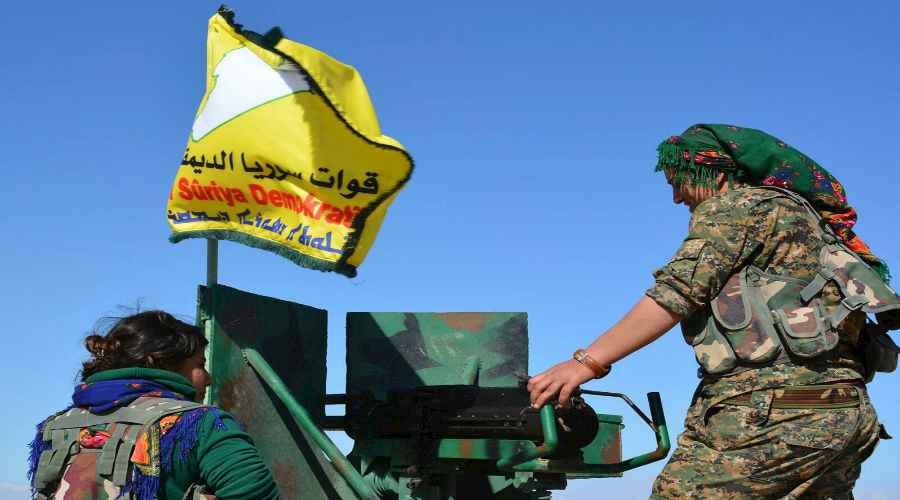Kurdish powers in Syria are showing a great deal of interest in the ongoing efforts of regional and international powers to conduct a new round of negotiations between the Assad regime and the armed opposition in Geneva on February 20, 2017. This is due to a number of events, which have recently increased the fears of the Kurds. The first was the exclusion of the Kurds from the Astana negotiations on January 23-24, 2017. An additional factor is the sponsoring state’s organization of another round of talks on February 6 to discuss the methods for monitoring the cease-fire. The February 6 talks did not achieve any agreement, and the Kurds were only given marginal representation. The sole representative was Ibrahim Biro of the Kurdish National Council, while both the Democratic Kurdish Union and the People’s Protection Unit of the Syrian Democratic Forces (YPG) were excluded from the conference.
A second event that has sown worry among the Kurds is the growing rapprochement between Russia, Turkey and Iran and their increased ability to organize and convince key factions to participate in the Astana conference. The rapprochement will largely affect how things will shake out in the near future, particularly given the fact that Russia is currently providing aid to the Kurds in their fight against ISIS.
A third concern is the possible change in the political strategy of the US towards the conflict in Syria. There is a possibility that newly elected President Donald Trump will shift his policies towards an increasing coordination with Russia and Turkey, in the light of its move to prioritize the fight against ISIS in Syria.
These events will impose direct implications upon the transnational political and security arrangements that will be negotiated among the stakeholders in the Geneva Conference. Such concerns will identify the potential transformations in the Kurdish views concerning the continuing political developments in the Syrian crisis.
Early Reactions from Kurdish Factions
Kurdish powers have expressed anger towards their exclusion from the Astana conference. The YPG sent a scathing message to the sponsors of the conference affirming that it would not adhere to any of the concluded agreements. According to the official spokesperson of the YPG, Colonel Talal Silo, stated, “we are not committed to [the conference] and neither are we committed to any decision that comes out of it”. While the conference was taking place, Kurdish militias continued their fight against ISIS in operation “Euphrates Anger.” These groups were able to recapture territory that have previously been under ISIS control. Some recent reports indicate that the International Alliance to fight ISIS has increased cooperation with the Kurdish militias and, for the first time, provided armored vehicles for their use in January 2017.
According to a number of assessments, the Kurdish factions will likely ignore the Astana arrangements and ceasefire locations. This is aggravating as the tensions could lead to confrontations between operations Euphrates Shield and Euphrates Anger, both of which are supported by opposing factions, Turkey and the Kurdish militia respectively.
Euphrates Shield forces are likely to continue advancing into the suburbs of Eastern Aleppo. Meanwhile, Turkey is expected to continue negotiating with the Trump Administration in order to expand their influence. These negotiations are a high priority for both parties, as made evident by Mike Pompeo, the new head of the CIA, setting his first mission abroad on February 9 to Turkey.
Some analysis indicate that Pomeo’s visit to Turkey is a sign of Washington willingness to coordinate with Turkey, and viewing it as a necessary ally in dealing with the current struggles in Syria. The analysis further assures that US envoy participation, as an observer, in the Astana conference indicate that it did not exert enough pressure on the concerned parties to assure the Kurdish militias inclusion in the conference, as a form of appeasement to Turkey.
However, others view that the current American political strategy, towards the Syrian conflict and the fight against ISIS, is not clearly defined. The current mood in America towards Syria is very clear, particularly in their fight against terrorism. Along these lines, Donald Trump issued a deadline on January 28, 2017 for the military to develop a concrete plan for combating ISIS.
In this respect, the plan, if executed, would return the US to a pivotal role in the International Alliance. Yet this would, in turn, affect the US relationship with Turkey and the Kurds, who previous allied with the Obama administration in their fight against ISIS.
In addition, the normalization of relations between Russia and Turkey, after the latter apologized for downing the Russian plane in November 2015, will affect the Russian-Kurdish alignment in Syria. After the reconciliation with Turkey, Russia recently reduced the amount of aid provided to the Kurds, marking a shift in its strategy in dealing with the Syrian crisis.
Unknown Trajectories
Kurdish powers will aim to continue their military operations against ISIS; however, a number of variables will determine the role and scope of their missions. The first variable is the results of the Geneva conference, and more specifically, the political and security arrangements that will fall into place as a result the conference.
Another determining factor of Kurdish involvement in the region will be how the US decides to fight ISIS, and the extent of the Turkish role in those operations.
The third factor is the new forms of understanding between the US, Russia and Turkey, after the US adopt its new concrete policies towards Syria.
To conclude, Kurdish forces in Syria seem to be on the verge of a new form of interaction with both regional and international powers involved in the Syrian crisis and in the fight against ISIS. These new interactions will most likely affect the Kurdish position in any upcoming political and security arrangements put in place after the Geneva conference convenes.


